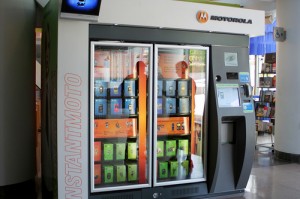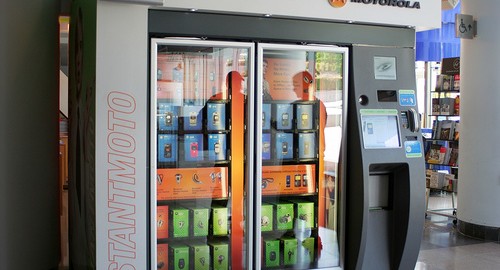Mobile Phone Vending Machine
 Have you recently walked by a high tech looking vending machine at an airport or mall? These aren’t your grandfather’s vending machines and they dispense more than just 75-cents worth of potato chips, soda and gum. Using credit cards, customers can purchase high-end cosmetics, cameras, and even cell phones, along with related accessories.
Have you recently walked by a high tech looking vending machine at an airport or mall? These aren’t your grandfather’s vending machines and they dispense more than just 75-cents worth of potato chips, soda and gum. Using credit cards, customers can purchase high-end cosmetics, cameras, and even cell phones, along with related accessories.
The reason for the proliferation of these vending machines is that they’re an incredibly productive sales outlet. Sales per square foot is a multiple of traditional retail stores. That means more sales, while paying lower rent and incurring no staffing expenses. If a certain location doesn’t work, simply load the machine on a truck and take it elsewhere. No staff layoffs, no lost investment in store décor and displays and no inventory liquidation considerations. Any high traffic location with power and a wireless cellular signal will do.
According to the Wall Street Journal, Japan already has five million advanced vending machines and the US is quickly catching up. While the implications of this retail trend is troubling for the jobs market, there’s no argument that it’s here to stay. In fact, advanced vending machines equipped with cameras, large touch screens and Internet connections are now offering customized service based on the customers’ gender and age, weather conditions and physical location.
While vending machines are operationally simpler to manage than traditional retail outlets, they’re still covered by the same tax regulations. In order to operate, they may require Tax IDs, business licenses, permits, sales and use tax returns, property tax renditions and income and franchise tax returns. Further, vending machines operate within local tax jurisdictions, which require monthly, quarterly and annual filings at multiple levels of local government (city, county and state.) As an example, a company that operates 10,000 vending machines may need to make a multiple of this number in tax filings annually. Hence, keeping track of due dates and filing requirements and maintaining copies of licenses, permits and returns is a challenge.



